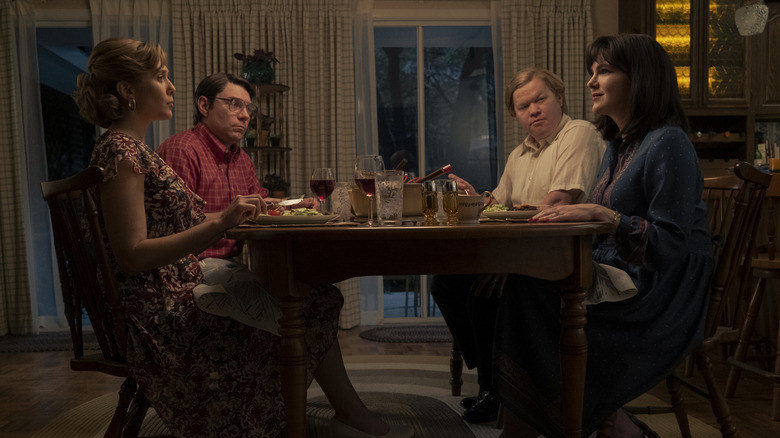Love And Death Review: Elizabeth Olsen Is Candy Montgomery In This Impenetrable Miniseries
The facts of the case: on June 13, 1980, 30-year-old housewife Candy Montgomery killed her friend Betty Gore with an axe in Wylie, Texas.
But why?
According to Candy, and her legal team, this was an act of self-defense. But Gore was struck 41 times, and after the murder, Montgomery cleaned herself up and tried to pretend nothing happened, denying any involvement in the murder until her trial. If this sounds familiar to you (beyond the fact that it's a true story), that's because this sordid tale was previously covered last year in the Hulu miniseries "Candy," starring Jessica Biel as Candy Montgomery and Melanie Lynskey as Betty Gore.
Now, HBO Max and writer-creator David E. Kelley attempt to cover the same ground with their miniseries "Love and Death." The fact that the series arrives after "Candy" is unfortunate, since the shows tell almost the same basic story in the same basic manner, complete with an in medias res opening and then a jump back in time. It also doesn't help that "Candy" covered these events in five succinct episodes, while "Love and Death" stretches on for an overlong seven. If you already watched "Candy," you might wonder why "Love and Death" even exists.
Answer unclear
Elizabeth Olsen plays Candy here, and her performance is sharp but also impenetrable. I promise I won't spend this entire review comparing "Love and Death" to "Candy," but I will say that Montgomery felt like a more fully realized individual in that series. The same goes for victim Betty Gore, who came across as a real, albeit flawed, person in "Candy" while here (played by Lily Rabe, who is just working with what she's given) she seems shrewish and vague. What, exactly, is "Love and Death" trying to say about these people? These events? This murder? The killing is portrayed in horrifying, graphic detail — with a distinct slant towards Candy's version of events — but besides feelings of abject horror, one gets the sense that "Love and Death" has no clear idea what it wants to be about, other than a scandalous, soap opera-esque tale of the dark side of suburbia.
Olsen's Candy is a sunny, church-going woman, married with children. But one day, seemingly on a complete whim, she decides to have an affair. Her potential paramour is Allan Gore (no Al Gore jokes, please), Betty's husband, played by Jesse Plemons. It's an unlikely match — Allan is socially inept and more than a little odd, and when Candy flat-out tells him she's attracted to him his only reply is "Oh, ok."
Eventually, the pair decide to go forward with the affair. They approach it pragmatically, working out rules and regulations they plan to follow to make sure things go smoothly. After a while, though, Allan decides to cut things off and devote himself fully to Betty. Is this what inspired Candy to kill Betty? Was she jealous of being rejected? I don't know, and watching this series gives one the sense that no one else does, either. You start to feel like you're shaking a magic 8-ball and getting "ANSWER UNCLEAR, ASK AGAIN LATER" results.
Love and Death can't escape the shadow of Candy
Try as it might, "Love and Death" just can't escape the shadow of "Candy." If this new miniseries had improved on what "Candy" was doing, or given us a fresh look at the players involved with the story, it might be something to write home about. Instead, "Love and Death" feels more like a regression — Candy remains a mystery, Betty is a mean-spirited woman who gets brutally murdered, and Allan is kind of a dope. Even with fewer episodes, "Candy" managed to make Montgomery's husband Pat feel like a real person. Here, as played by Patrick Fugit, he mostly just recedes into the background.
Perhaps there are no good answers in the Candy Montgomery case, and perhaps that's what "Love and Death" ultimately wants to say. That no matter how much info we're given, and no matter how much insight we have, we can never know exactly what happened in Betty Gore's house on June 13, 1980. But that feels like a cheap cop-out. Is obliterating someone's face with 41 axe swings really self-defense — or something else? Something far more complicated? You might not know the answer to that question, and neither does "Love and Death."


